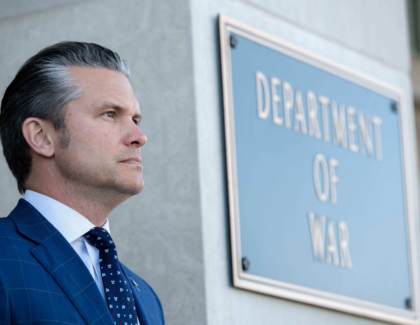Sign up for the daily CJR newsletter.
Today was supposed to have been the day. Two years ago, on March 29, 2017, Theresa May, the Prime Minister, triggered the separation process for the United Kingdom to leave the European Union. And that may still, pending some parliamentary miracle, take place. But when it became clear that the UK government wouldn’t be able to both pass a deal and meet the original March 29 deadline, May asked for an extension. OK, the EU said, if British MPs can settle on a withdrawal agreement by March 29, the UK can buy itself some time—about two months—to sort out the paperwork. But if not, the UK will only have until April 12 to find an alternative, or else face leaving the EU without a plan in place.
The details of the process are utterly confusing, and that’s compounded by the characters involved: Andrea Leadsom, the leader of the House of Commons, told lawmakers that the UK government had decided to split the withdrawal agreement from the political declaration that will determine the future UK-EU relationship—enraging opposition Labour lawmakers and some Conservatives. Boris Johnson—an MP and former mayor of London, known as an arch-Brexiteer who once accused May of having “wrapped a suicide vest around the British constitution”—has decided to back her deal. In the media, Britain seems to have gone full Fox News, taking a page out of the Murdoch playbook by putting the most incendiary and salacious figures possible on TV programs. The effect has been, of course, a distortion of political debate and a deepening of divides.
ICYMI: Strangest Rollout: After the Mueller report, news outlets were left scrambling and speculating
By putting Jacob Rees-Mogg, a prominent Conservative backbencher, and Nigel Farage, Brexit party leader, on current affairs shows, the British media have made public figures into reality television stars and given them an audience of the whole of Britain, George Monbiot argues in a column for The Guardian. Monbiot writes that this has happened over and over again in British media: a platform is given to someone with a despicable, nonrepresentative viewpoint for no discernable reason, instead of being given to a more rational thinker. Ultimately, the networks gain, while the public loses. Isabel Oakeshott, a longtime Brexit supporter, was found to have withheld information about Russia’s ties to Brexit—and still, she was invited onto several news outlets, which she used to make her pitch. The BBC gave air time on its new Scottish channel to a man named Mark Meechan, who is notable only for being fined for posting a video in which he shows he’s trained his girlfriend’s dog to give a Nazi salute. (At the same time, Carole Cadwalladr, an investigative journalist, was “largely frozen out by the BBC,” Monbiot writes.) The list goes on.
Sound familiar? Much in the same way that Donald Trump and Tucker Carlson have maintained their public profiles with the help of cable TV, so too has Boris Johnson, who initially led the campaign to leave the EU and now keeps himself relevant making public incendiary comments on air. Amid dropping ratings, competition in a crowded marketplace, and a 24-hour news cycle that is nearly impossible to satisfy, gaining attention matters above all else, including diversity of ideas or the quality of content. If blustery figures of any political stripe are helping to bring in viewership, does it matter if what they’re saying is hateful or factually incorrect? Brexit long ago crossed the threshold into absurdity, and British TV news has followed.
Friday may force British lawmakers to find an end to their country’s madness. Britain may find a way to leave the EU; it may not. Regardless of what happens, the country and the public will be left to grapple with the consequences of what Brexit has done to their media.
More Brexit news:
- Brexit was, theoretically, about taking back control of the UK’s immigration laws, its economy, and its future. Instead, writes Yasmeen Serhan in The Atlantic, it has sowed chaos and resulted in seemingly permanent political squabbling.
- In the Irish Times, Irish reporters and writers weigh in: “Brexit is aggressive and dangerously nostalgic. The UK is in for a brutal chastening.”
- The UK’s identity crisis came with an impossible deadline, writes Joseph Sternberg in the Wall Street Journal.
Other notable stories:
- For CJR, Elizabeth Drew writes about how the media played the Mueller report—and why covering the story was so much harder than in news events past.
- The Marshall Project is launching a print publication to be distributed in jails and prisons. News Inside, which is currently being distributed in facilities in 19 states, is edited by Lawrence Bartley, a former inmate.
- Charles Harder—Donald Trump’s personal attorney, who also represented Hulk Hogan in his lawsuit against Gawker—“has sued or subpoenaed reporters on behalf of clients those reporters wrote about,” writes Insider’s Keenan Trotter.
- On Medium, Barrett Brown publishes leaked emails detailing The Intercept’s decision to shut down the Snowden Archive.
- The US Census Bureau has asked Google, Facebook, and Twitter for help protecting its upcoming 2020 count from disinformation campaigns intended to dissuade participants, Reuters reports.
- Instagram is one of the only social media platforms where Alex Jones, of InfoWars, is allowed to have an official account. According to internal emails obtained by Business Insider, executives at Facebook have debated internally about designating Jones as a “hate figure,” which would cut him off of Instagram, too.
- Patrick Soon-Shiong, the billionaire who owns the Los Angeles Times tells NiemanLab about his vision for the paper. He’s increased the newsroom headcount from 440 to 535 journalists in a year, taking a $50 million loss to invest in growth.
ICYMI: Why the Post was wrong to give Erdoğan a platform
Has America ever needed a media defender more than now? Help us by joining CJR today.







